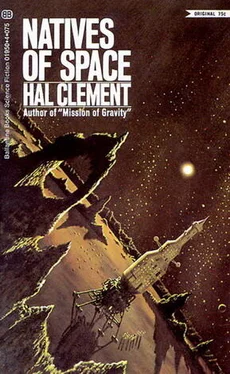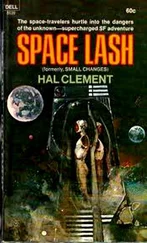At the moment, Talker was not worrying about his course of action. He was sound asleep, crouched on the padding of the floor of his quarters. Boss, having made sure that his own contributions toward the present state of near-success were not being minimized in the rapidly spreading news, also retired. The second officer made sure that both air locks were fast, and made his way to the long wardroom in the lower part of the ship. Most of the soldiers and several engineers were gathered there, discussing the day’s events and the chances of reaching their original planetary system — they no longer had “homes” since Boss had broken allegiance with his overlord. The officer’s presence did not interrupt the conversation; the Second was a member of the soldier class, and entered the discussion on an equal plane with the others.
It is exceedingly doubtful if any of the crew had ever objected to Boss’ dereliction; the act had made little or no change in the course of their existence, and they cared little for whom they worked and fought. If anything, they preferred the new state of affairs, for the constant internecine warfare between the rulers of their home world resembled organized piracy more than anything else, and there was now no need to turn over most of the loot to their own overlord.
Boss, of course, had acted almost on impulse, giving little or no thought to such matters as the problem of replenishing exhausted food and ammunition — he expected to supply those wants from his victims. Unfortunately, an unexpected encounter with a full-armed ship belonging to his erstwhile ruler had left him in no condition to fight anybody; after three or four attempts to bluff supplies from isolated stations in his own system, he had made matters a little too hot for himself and fled in the handiest direction, which happened to be straight away from the four pursuing warships. Near the speed of light, his vessel became indetectable; and once out of his own system, he had not dared to stop until Sol was bright on his navigation plates. His reasons for landing on Earth have already been made clear. He had food in plenty, and his ship drew its power from stellar radiations; but, not a locker on his ship contained a round of ammunition.
If the discomfort of their environment had turned any of Boss’ crew against him, Talker’s recent efforts had brought them back. The second officer found himself in complete agreement with the crew — it was good to have a commander like Boss, to keep things under control! There passed a peaceful and happy evening on Boss’ vessel.
Boss had found it almost impossible to set regular watches. No matter how often he relieved his men, the inactivity of the job promptly put the relief to sleep. The bodies of the crew, exhausted by the constant battle against Earth’s savage gravity, would give up and drop the individuals into a coma before they realized that the stimulant accelerine had worn off. The sleep was short, but apparently unavoidable; Talker, alone, had been able to force himself to more or less regular waking and sleeping hours, simply because he did practically no manual labor. For this reason, as soon as he was convinced that there was nothing in the neighborhood that constituted a menace to the ship itself, Boss ceased setting watches and merely closed the ports at night. There were enough differences in physique among the crew members to make it practically certain that someone would always be awake, day or night. The whole thing was horribly unmilitary by any standards, but it was typical of Boss’ line-of-least-resistance nature.
It chanced that Boss himself was asleep when Kirk showed up the next morning, and the ports were still sealed. The man threw a stone at the air-lock door, and examined the ship more closely while he waited for something to happen. The Sun had just cleared the tree and was shining directly on the bow of the vessel. This time, Kirk found that he could see a little through the control-room ports — a few glimpses of boards, covered with dials and levers, the latter oddly shaped to conform to the peculiar “hands” of the operators. He was not close enough to the ship to obtain a very wide vision angle through the ports, and he had to move around to see the various parts of the chamber. While he was thus improving his knowledge, his eye caught a flash of reflected sunlight from the beveled edge of the air-lock door, and he turned to see who or what was emerging.
The sound of the stone Kirk had thrown had echoed through the main corridor and reached the “ears” of a party of engineers in the wardroom below. These individuals had interrupted a form of amusement startlingly similar to contract bridge, in which they were engaged, and one had gone to inform Boss. The latter cursed him, told him to rouse Talker, and went back to sleep.
It was Talker, therefore, followed by some of the more curious engineers, who emerged from the lock. Kirk was able to recognize the herald by his antennae, but could discern no difference between the other members of the group. The meeting adjourned, at Talker’s direction, to a spot in the gully, in front of the ship, which bore a large and exceptionally smooth area of sun-dried clay, and lessons began. Talker had brought the appropriate materials with him, and had planned to take notes in his own form of “writing”; but he delegated this task to a member of the audience, and gave his full attention to the delicate matter of guiding the choice of words in the proper direction.
This task was no sinecure, since Talker was still extremely uncertain as to the precise nature of words. The meaning covered by a single word in English sometimes requires several in another language; the reverse is also true. Talker had learned the symbol that indicated the ship; he discovered later, to his confusion, that there exist such things as synonyms, other words that mean the same thing. He never did discover the variety of objects that could have been meant by “ship.” Kirk saw these sources of difficulty almost from the beginning, and went to considerable trouble to avoid them.
Each written word, to Talker, was a complete unit; it is doubtful if he ever discovered that they were made of twenty-six simple marks, in various combinations. Obviously this fact complicated his task enormously, but there was nothing to be done about it. To explain the individual letters would have been tantamount to teaching the verbal language; and months, or even years, would have been necessary to teach Talker’s auditory organs to recognize the innumerable fine distinctions of pitch and overtone to be found in a single sentence.
The details of the weeks that were taken up in the learning would be of interest to psychologists and semanticists, but would extend the present narrative to an unjustifiable length. There were several short interruptions when Kirk had to forage for food, and once he, was forced to absent himself for nearly a week, in order to turn in his parasite report at the nearest center of civilization. He told no one of his find in the forest, and returned thereto as quickly as he could.
He found the aliens impatiently waiting for him, and the herald at once returned to the task. Kirk had long since perceived that some tremendous anxiety was behind Talker’s insistence, but no amount of effort served to make clear any details.
September and Kirk’s patience were drawing to an end by the time that exchange of ideas had progressed to a point where it could be called conversation. Talker wrote with considerable facility, using a pencil and pages from Kirk’s notebooks; the man spoke aloud, since he had discovered that this apparently resulted in a sharper mental image of the words. To him, the herald’s need was less urgent than the satisfaction of his own curiosity; he asked, so far as Talker’s rapidly increasing vocabulary would permit, questions designed to fill that want. He learned something of the physical and sociological nature of the alien’s home world — not too much, for Talker had other ideas than the telling of his life story, and Boss became suspicious and almost aggressive when informed of the nature of the Earthman’s curiosity. He could conceive of only one use to which such information could possibly be turned.
Читать дальше












